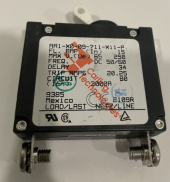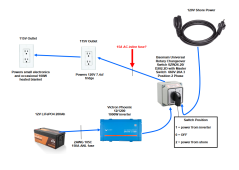Tomthumb62
Solar Wizard
- Joined
- Sep 25, 2022
- Messages
- 1,871
FINAL EDIT: I finally FOUND an inline breaker. It's AC/DC rated, here's the 15A version:


EDITED to add: This is a homemade camp trailer. It has a DC fuse panel, but not one for AC. It originally had 1 single outlet that hooked up to an extension cord to shore power.
EDIT #2: Okay, so my google-fu is working better today. Is this the sort of thing I want (I think it might be): https://www.grainger.com/product/40...LIwzUd9zgYoIr8pOe3caAqgqEALw_wcB&gclsrc=aw.ds
***
So my main question is where can I find a simple in-line AC 15A fuse or breaker? In-line options seem to exist for DC but not AC. I don't want/need an entire breaker panel, I just want to protect two AC outlets. While each NEMA-15 outlet gives me two ports, 4 in total, I will never be using all 4 to draw power at once. Our AC needs are limited. The biggest draw will be the AC fridge, which I measure 600-800W on compressor startup and 50-80W running using a kill-a-watt meter. We will charge small electronics like phones and laptops and if battery storage suffices, possibly run a 100W electric blanket for about an hour/day during colder months. This is a recreational camp trailer but my wife will be living in it for a couple of months this summer as she visits family.
Also, since I've never run wire before for AC outlets and this is in a high-vibration situation, I assume I would NOT want to run solid copper wire through conduit, but rather flexible wiring such as used in vehicle DC systems in conduit would be preferable. I will be having an electrician friend look this over in person, but I want to make sure I'm coming to him with the right ideas to begin with, so I appreciate your input! And since I've never run through conduit before, is plain ol' 1/2" PVC pipe sufficient here? The wiring/conduit would go between a 1/4" plywood wall and 1/4" steel wall, with foam board and wool pile for insulation. Being such a small run, I envision I could run the wire by hand through the PVC, then glue the two 90-degree joints (joints not shown in diagram). Is there any danger using 90-degree joints here? 12/3 wire sufficient?

Many connections like SCC, shore power charger and 12v house loads not shown for clarity.

Blue Sea 7210-BSS Circuit Breaker AA1 15A NEW! FREE SHIPPING! | eBay
Find many great new & used options and get the best deals for Blue Sea 7210-BSS Circuit Breaker AA1 15A NEW! FREE SHIPPING! at the best online prices at eBay! Free shipping for many products!
www.ebay.com

EDITED to add: This is a homemade camp trailer. It has a DC fuse panel, but not one for AC. It originally had 1 single outlet that hooked up to an extension cord to shore power.
EDIT #2: Okay, so my google-fu is working better today. Is this the sort of thing I want (I think it might be): https://www.grainger.com/product/40...LIwzUd9zgYoIr8pOe3caAqgqEALw_wcB&gclsrc=aw.ds
***
So my main question is where can I find a simple in-line AC 15A fuse or breaker? In-line options seem to exist for DC but not AC. I don't want/need an entire breaker panel, I just want to protect two AC outlets. While each NEMA-15 outlet gives me two ports, 4 in total, I will never be using all 4 to draw power at once. Our AC needs are limited. The biggest draw will be the AC fridge, which I measure 600-800W on compressor startup and 50-80W running using a kill-a-watt meter. We will charge small electronics like phones and laptops and if battery storage suffices, possibly run a 100W electric blanket for about an hour/day during colder months. This is a recreational camp trailer but my wife will be living in it for a couple of months this summer as she visits family.
Also, since I've never run wire before for AC outlets and this is in a high-vibration situation, I assume I would NOT want to run solid copper wire through conduit, but rather flexible wiring such as used in vehicle DC systems in conduit would be preferable. I will be having an electrician friend look this over in person, but I want to make sure I'm coming to him with the right ideas to begin with, so I appreciate your input! And since I've never run through conduit before, is plain ol' 1/2" PVC pipe sufficient here? The wiring/conduit would go between a 1/4" plywood wall and 1/4" steel wall, with foam board and wool pile for insulation. Being such a small run, I envision I could run the wire by hand through the PVC, then glue the two 90-degree joints (joints not shown in diagram). Is there any danger using 90-degree joints here? 12/3 wire sufficient?

Many connections like SCC, shore power charger and 12v house loads not shown for clarity.
Last edited:


